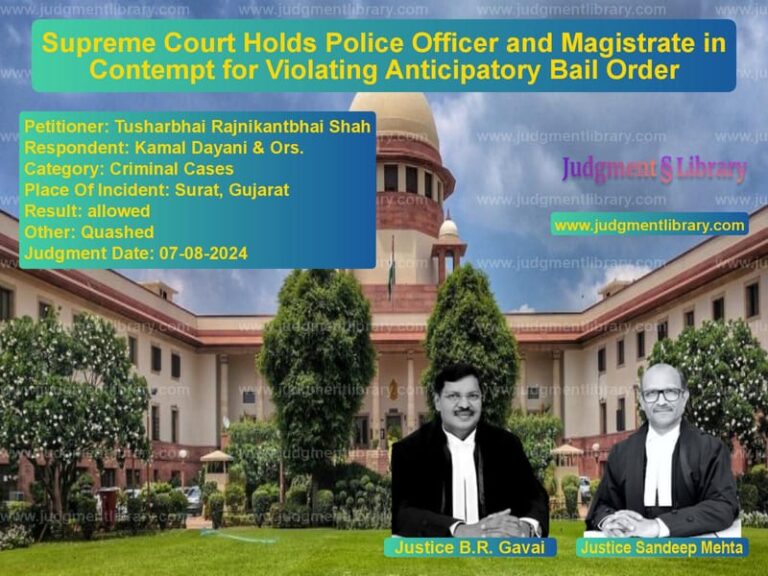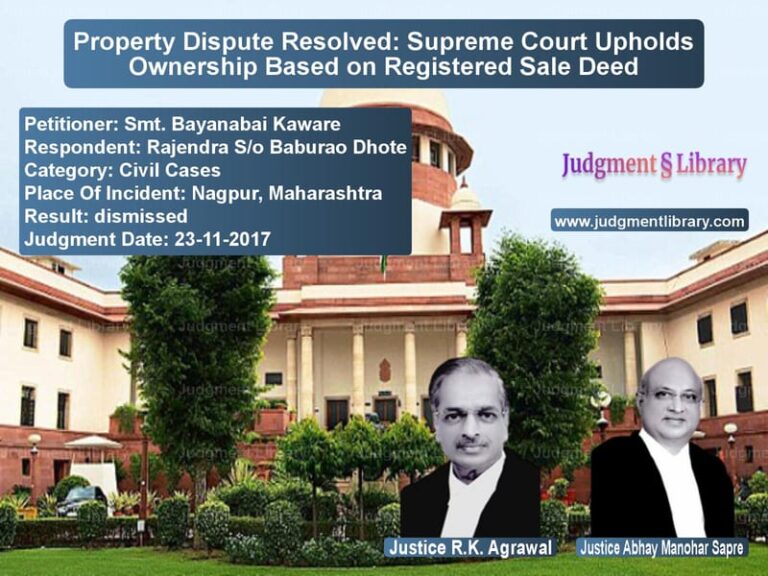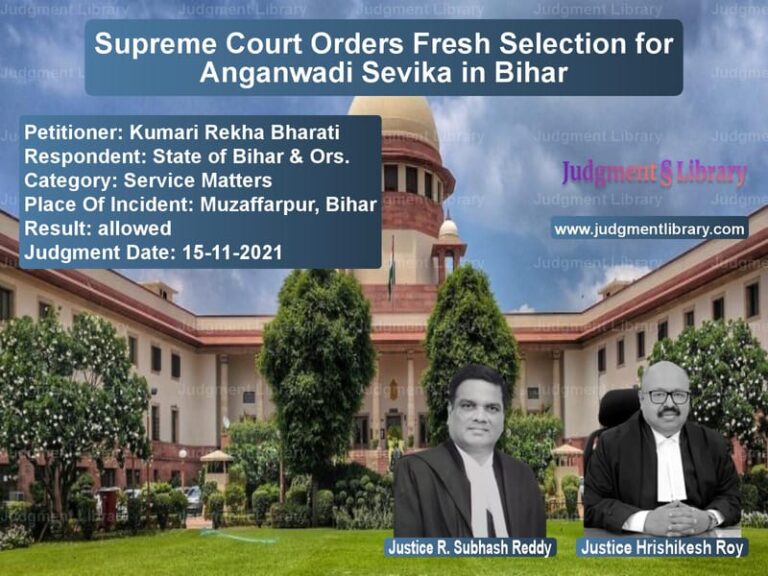Orissa Murder Case: Supreme Court Grants Bail to Daughter Convicted of Murder
The case of Pragna Paramita Praharaj vs. State of Orissa involves a murder conviction where the appellant, along with her parents, was sentenced to life imprisonment. The Supreme Court, after reviewing the facts and circumstances, granted bail to the appellant pending the outcome of her criminal appeal before the High Court. This case highlights the complexities involved in criminal appeals and the considerations for granting bail post-conviction.
Background of the Case
The case pertains to the murder of a young man, Sanjay Rana. The prosecution accused three individuals:
- The appellant, Pragna Paramita Praharaj (daughter)
- Her father
- Her mother
All three were convicted by the Sessions Court, Jajpur, in CT No. 76/2010 and sentenced to life imprisonment. The trial court found the accused guilty based on circumstantial evidence and witness testimonies, leading to their conviction under Section 302 of the Indian Penal Code (IPC).
Trial and Conviction
The trial was conducted before the District and Sessions Court, Jajpur. The prosecution’s case was built upon:
- Eyewitness testimonies stating that the accused had a role in the murder.
- Forensic evidence suggesting the involvement of the three accused.
- Motive derived from a personal dispute between the victim and the accused.
After analyzing the evidence, the Sessions Court convicted all three accused and sentenced them to life imprisonment.
Appeal Before the High Court
The convicted individuals filed an appeal before the High Court of Orissa (Criminal Appeal No. 202 of 2015), challenging their conviction and sentence. Meanwhile, the appellant separately filed a bail application (Misc. Case No. 528 of 2015) before the High Court, requesting suspension of her sentence pending the appeal. However, on May 11, 2015, the High Court rejected the bail plea.
Arguments of the Petitioner (Appellant)
The appellant, through her legal counsel, made the following arguments:
- She had no direct involvement in the crime and was convicted solely based on circumstantial evidence.
- Her continued incarceration without bail would cause irreversible damage to her life and reputation.
- The appeal was likely to take several years to be decided, making prolonged detention unjustified.
- There was no risk of her absconding if bail was granted.
Arguments of the Respondent (State of Orissa)
The prosecution, opposing the bail plea, argued:
- The appellant was convicted based on strong circumstantial evidence.
- The crime was of a serious nature, involving the premeditated murder of an individual.
- Releasing the appellant on bail could allow her to tamper with evidence or influence witnesses.
- The appellant’s involvement in the crime could not be overlooked just because of her gender.
Supreme Court’s Observations
The Supreme Court, after reviewing the facts and circumstances, found merit in the appellant’s plea. The court noted:
“Having regard to the totality of the facts and circumstances appearing in the case, which need not be detailed in our order, we are of the considered opinion that the appellant-Pragna Paramita Praharaj be released on bail during the pendency of her appeal before the High Court.”
The Court considered factors such as:
- The appellant’s role in the alleged crime.
- The nature of evidence against her.
- The likelihood of the appeal succeeding.
- The prolonged duration of criminal appeals in India.
Legal Precedents Considered
The Supreme Court referred to previous rulings regarding bail in post-conviction scenarios, including:
- Kashmira Singh vs. State of Punjab (1977) 4 SCC 291: The Court held that if an appeal is likely to take a long time, the appellant may be granted bail.
- State of Maharashtra vs. Sitaram Popat Vetal (2004) 7 SCC 521: Emphasized that bail post-conviction should be granted only in exceptional cases.
- Babu Singh vs. State of U.P. (1978) 1 SCC 579: Highlighted that delay in the disposal of appeals is a key factor in granting bail.
Final Judgment
The Supreme Court ruled:
“Accordingly, it is directed that the appellant named above be released on bail to the satisfaction of the Court of District and Sessions Judge, Jajpur, in CT No. 76/2010 during the pendency of her Criminal Appeal No. 202/2015.”
The appeal was allowed, and any pending applications in connection with the case were disposed of.
Impact of the Judgment
The Supreme Court’s decision in this case has several important implications:
- It reinforces the principle that bail should be granted in cases where appeals are likely to take years.
- It highlights the role of courts in balancing the rights of the accused with the interests of justice.
- It sets a precedent for similar cases where convicted individuals seek bail post-conviction.
Conclusion
This case highlights the Supreme Court’s approach in balancing individual liberty with the interests of justice. The ruling ensures that the appellant remains out on bail while her criminal appeal is under consideration before the High Court. The case serves as an important reminder that courts must ensure fair treatment of accused individuals while safeguarding the legal process.
Don’t miss out on the full details! Download the complete judgment in PDF format below and gain valuable insights instantly!
Download Judgment: Pragna Paramita Prah vs State of Orissa Supreme Court of India Judgment Dated 20-05-2016-1741860966185.pdf
Direct Downlaod Judgment: Direct downlaod this Judgment
See all petitions in Murder Cases
See all petitions in Bail and Anticipatory Bail
See all petitions in Judgment by Abhay Manohar Sapre
See all petitions in Judgment by Ashok Bhushan
See all petitions in allowed
See all petitions in supreme court of India judgments May 2016
See all petitions in 2016 judgments
See all posts in Criminal Cases Category
See all allowed petitions in Criminal Cases Category
See all Dismissed petitions in Criminal Cases Category
See all partially allowed petitions in Criminal Cases Category







